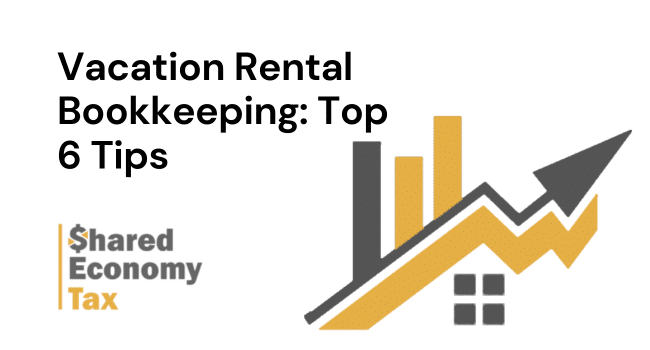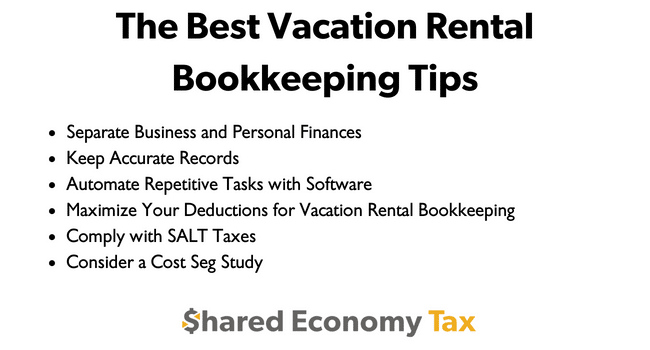
Running a vacation rental can be exciting and financially rewarding. Managing the financial aspect of your business is essential, and there is more to do beyond counting the money flowing into your bank account. We’ll look at the best practices for vacation rental bookkeeping and mistakes to avoid.
Vacation Rental Bookkeeping Basics
Vacation rental operators can face multiple challenges unique to this business’s nature.
Managing multiple rentals means tracking expenses for each property separately. This is because you’ll need to break out your expenses at tax time.
Moreover, vacation rentals also suffer from seasonality and cash flow issues that you must manage throughout the year. Though you may make more money around the summer (or winter if you’re in a ski area), you’ll need to maintain your property and pay bills throughout the year. Furthermore, accurate books are necessary to ensure you know which expenses are coming up and that you’ll have enough cash to cover the slow periods.
Vacation rental operators must have updated cash flow and profit-and-loss statements throughout the year.
The profit-and-loss statement will help you determine how much income your business is making and estimate your taxes due on the income at the end of the year.
The cash flow statement tracks where the income (cash) from the business is going. It does so whether paying for expenses, investing in your property, or paying down the principal on your loan. Furthermore, the cash flow statement will help you determine if you have enough cash to maintain your vacation rental for the foreseeable future.
The Best Vacation Rental Bookkeeping Tips
We’ve compiled a list of the best tips for managing your vacation rental bookkeeping.
Separate Business and Personal
Having separate accounts (a bank account and a credit card) can help you determine which expenses relate to your business. If you have formed a separate entity for your rental, you’ll need to keep your accounts separate so that you don’t reduce the liability protection of having an entity.
The best practice is to only use your business accounts for business expenses and not to pay business expenses from your personal accounts. Furthermore, you can take distributions from your business but do so by transferring funds to your personal account and then spending the money.
Keep Accurate Records
For tax purposes, you should keep receipts for any expense related to your business. However, you don’t need to keep the physical receipt – a digital copy will work. In most accounting software, you can attach digital copies of receipts or invoices to specific transactions.
You’ll need this backup in the event of an audit. If you do not have receipts, the IRS may disallow the deduction. Additionally, you should make notes on your receipts to help you remember the reason for the expense, which property it is related to, and what was purchased.
You should keep records for seven years.
Automate Repetitive Tasks with Software
Vacation rentals have many recurring costs. Furthermore, these expenses may include your mortgage payment, streaming subscriptions, or alarm bills.
You should look for accounting software that allows you to record these transactions each month automatically. Automatic entry will minimize the time you spend doing manual data entry. This will minimize potential errors and save you a significant amount of time.
Maximize Your Deductions for Vacation Rental Bookkeeping
You should consider all possible deductions related to your vacation rental. Additionally, the normal deductions that rental managers take include mortgage interest, property taxes, and utilities.
But there are other possible deductions, including internet expenses for running your business, a portion of your cellphone bill, the cost of travel to visit your property, and postage.
Maximizing your deductions can lower your taxable income and have a lower tax bill at the end of the year.
Comply with SALT Taxes
Ensure you know all state and local taxes (SALT) related to your rental. Furthermore, these will vary considerably depending on where your rental is located.
Many localities charge sales tax, occupancy taxes, and licensing fees for short-term vacation rentals. You’ll need to check with your local tax authorities to ensure you comply with all local regulations. Noncompliance can lead to hefty fines or authorities shutting down your rental.
Several cities have recently enacted short-term rental licensing programs, and many have used prior compliance with local tax laws as one of the criteria for awarding licenses.
Consider a Cost Seg Study
Depreciation can lower your taxable income on your vacation rental. This means, you should consider having a cost seg study to maximize your depreciation deduction. This study will determine how much of your purchase price should be allocated to land, buildings, land improvements, and other assets. Each of these asset classes has a different depreciation schedule, and the allocation can change your taxable income considerably.
Furthermore, there is an upfront cost to having the cost seg study done. But the tax savings usually mean the study pays for itself. We recommend cost seg studies highly for real estate investors.

The Most Common Mistakes to Avoid
The most common mistake in vacation rental bookkeeping is procrastinating. Waiting until the end of the year (or the day before tax day) can lead to stress and overlooked deductions. Additionally, when it comes to bookkeeping, maintaining your books throughout the year will mean that you’re less likely to forget about expenses.
If you do not reconcile your accounts regularly, you’ll have to dig through a year of records to find more information on categorizing expenses. If you have multiple properties, this will be compounded by determining which property each expense belongs to.
Closing Thoughts on Vacation Rental Bookkeeping
For immediate improvement in your bookkeeping, start by organizing your financial records, automating tasks, and educating yourself on local tax laws. However, these tips are meant to provide a foundation. Consulting a tax professional will yield tailored advice, ensuring you maximize benefits while staying compliant.
In the world of vacation rentals, success isn’t just about the guest experience. Success is about the meticulous management of every dollar and cent. Additionally, effective and up-to-date bookkeeping can help you minimize your taxes (and headaches) at the end of the year.